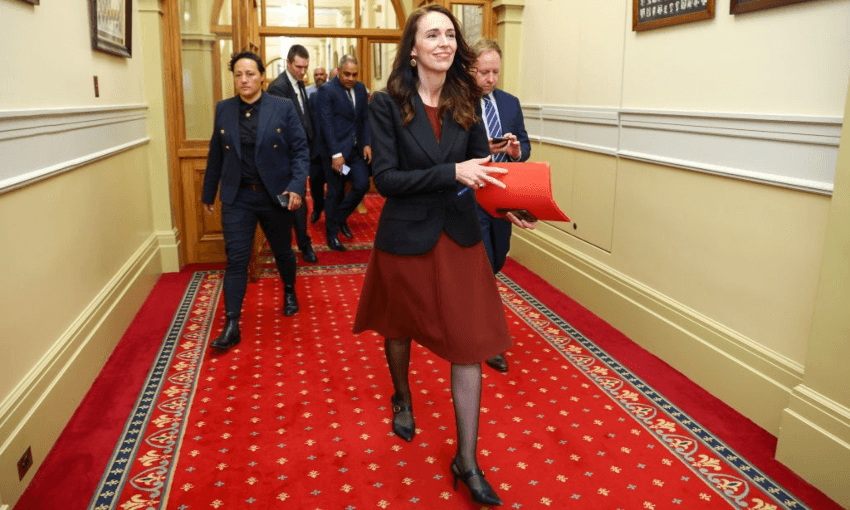During Helen Clark’s second term, Don Brash’s Ōrewa speech saw National surge in the polls and the Labour government’s social policies tighten. Fifteen years years later, could history repeat?
When a socially progressive party wins an overwhelming electoral mandate, it’s natural to wonder how long its luck will last. Will Labour really implement strong social justice policies to lessen inequality and racism or take serious steps towards a green economy? Will doing this shorten the party’s time in power?
Such questions rest on the premise that progressive political parties are the advance guard of political change. In fact, they more often reflect changes in social reality due to community pressure and new cultural norms. Their election shows the ground has shifted, a new public consensus has emerged. Political space has been created for them to take up the torch.
Yet, without continuous broadening of public support and critical pressure, we cannot expect any party to extend a policy agenda of real change beyond a couple of elections. For this to happen, we need alliances to be built across interest groups in the community who may not be in complete agreement but have much in common in their vision for the country.
During Helen Clark’s second term, Don Brash, then opposition leader, gave his Ōrewa speech against Māori “separatism”, leveraging the anxiety of middle New Zealand (or firing up the pathology of white racism, if you prefer). The speech lifted the National Party from 28% in the polls to 45% within two weeks and ahead of Labour. The constraints on the Labour government’s social policies tightened just at the point it seemed ready to go further.
I wrote an academic critique shortly after that was widely unread. I tried to fathom what ideological tinder had been available to Brash’s pyromania and why progressives had ceded the ground of identity politics to the right.
Being a social scientist, I focused on my discipline’s failure to resource a public debate about race, identity, indigeneity and social justice that would be a prophylactic against the hijack of liberal positions for right-wing ends.
The Brash proposition was that liberal democratic government legitimised by majority voting would be endangered by recognition of indigenous rights, the rights of a racialised minority.
My concern was hardly a new insight. Authoritarian governments in Asia, especially post-Tiananmen, June 4, 1989, commandeered progressive arguments about recognising cultural differences to justify their repressive acts under the cover of “Asian values”. The notion of universal human rights was claimed to be a neocolonial imposition.
However, I soon learned that a self-critical contest of ideas from within the academic community was at best regarded by some as unnecessary, at worst, politically unwelcome, even racist. (Somewhat ironic since the origins of “progressive” identity politics are imposed constructions of race.)
My remaining hope was that a new social reality would naturally develop led by a new generation. Rather than having to assent to an ideological creed, they would simply assume shared values across cultures, be comfortable with and endorse the status of tangata whenua, and live with the recognition of multiple inheritances as unexceptional. This social reality would blunt the Brash formula should anyone try it again.
Fifteen years later, has this new reality emerged? Maybe.
For example, the prime minister said the new ministerial lineup “…is both a cabinet with huge merit and talent, which also happens to be incredibly diverse. I think it’s an important point to make – these are individuals who have been promoted for what they bring to cabinet, they also reflect the New Zealand that elected them.”
So will Jacinda Ardern face a similar constriction to Helen Clark at the same point in her administration? At first sight, it appears not. National is in disarray and, thankfully, dog-whistling racism is widely and quickly condemned. New Zealand stands out for its response to the Christchurch massacre of Muslim citizens. The prime minister has political capital in spades.
But there is some dry kindling wood.
I’m not talking about Billy T.K.’s 20,000 votes, although that is a worry if Facebook or the media renege on countering the lies.
I’m more worried about the tendency of progressive social movements to value their differences above their common goals or to seek economic advantage without working for a more sustainable economic system. The resulting confusion and bad blood would be a gift to those who would oppose green initiatives or reform of the justice and health systems to empower Māori.
With New Zealand First shunned from the public stage, the alienation of immigrant Chinese New Zealanders might begin to be repaired. Or will some group use the extremes of the Xi Jinping administration to question their citizenship? Using ethnicity as a definition of citizenship or loyalty would light quite a fire at home and have serious repercussions abroad.
Yet, we can be optimistic. The shift in New Zealand’s social reality and its inclusive political leadership mean there is an unprecedented opportunity if we build alliances to extend the social and climate justice agenda beyond the electoral cycle, making it intergenerational.
Christopher Tremewan is honorary research fellow in international relations at the University of Auckland.

